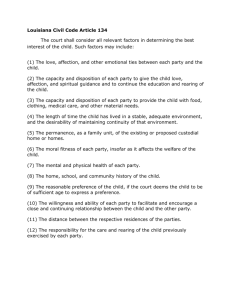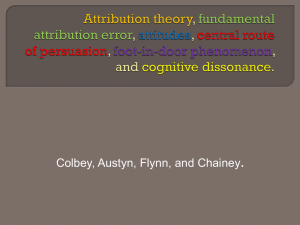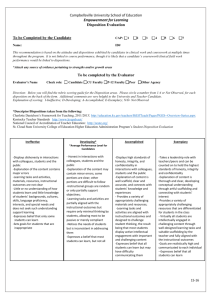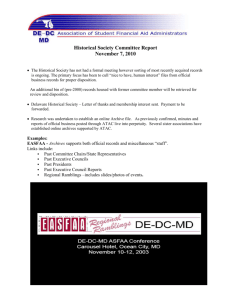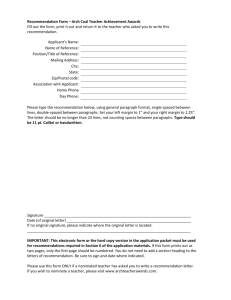Disposition Assessment Policy (CAP 1)
advertisement
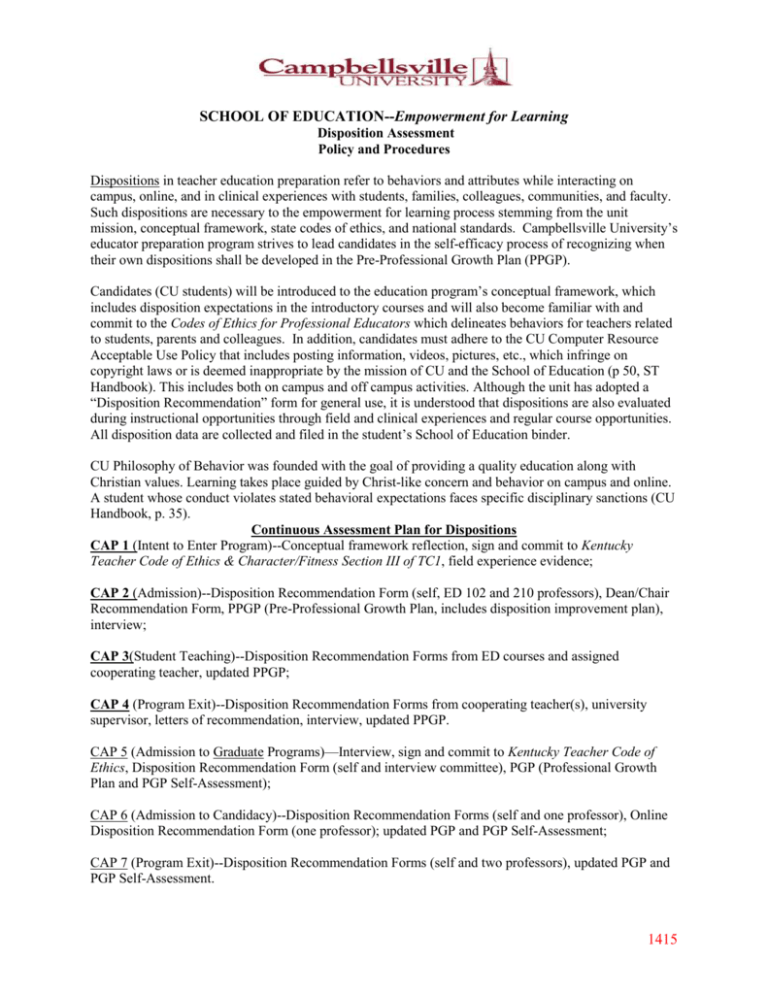
SCHOOL OF EDUCATION--Empowerment for Learning Disposition Assessment Policy and Procedures Dispositions in teacher education preparation refer to behaviors and attributes while interacting on campus, online, and in clinical experiences with students, families, colleagues, communities, and faculty. Such dispositions are necessary to the empowerment for learning process stemming from the unit mission, conceptual framework, state codes of ethics, and national standards. Campbellsville University’s educator preparation program strives to lead candidates in the self-efficacy process of recognizing when their own dispositions shall be developed in the Pre-Professional Growth Plan (PPGP). Candidates (CU students) will be introduced to the education program’s conceptual framework, which includes disposition expectations in the introductory courses and will also become familiar with and commit to the Codes of Ethics for Professional Educators which delineates behaviors for teachers related to students, parents and colleagues. In addition, candidates must adhere to the CU Computer Resource Acceptable Use Policy that includes posting information, videos, pictures, etc., which infringe on copyright laws or is deemed inappropriate by the mission of CU and the School of Education (p 50, ST Handbook). This includes both on campus and off campus activities. Although the unit has adopted a “Disposition Recommendation” form for general use, it is understood that dispositions are also evaluated during instructional opportunities through field and clinical experiences and regular course opportunities. All disposition data are collected and filed in the student’s School of Education binder. CU Philosophy of Behavior was founded with the goal of providing a quality education along with Christian values. Learning takes place guided by Christ-like concern and behavior on campus and online. A student whose conduct violates stated behavioral expectations faces specific disciplinary sanctions (CU Handbook, p. 35). Continuous Assessment Plan for Dispositions CAP 1 (Intent to Enter Program)--Conceptual framework reflection, sign and commit to Kentucky Teacher Code of Ethics & Character/Fitness Section III of TC1, field experience evidence; CAP 2 (Admission)--Disposition Recommendation Form (self, ED 102 and 210 professors), Dean/Chair Recommendation Form, PPGP (Pre-Professional Growth Plan, includes disposition improvement plan), interview; CAP 3(Student Teaching)--Disposition Recommendation Forms from ED courses and assigned cooperating teacher, updated PPGP; CAP 4 (Program Exit)--Disposition Recommendation Forms from cooperating teacher(s), university supervisor, letters of recommendation, interview, updated PPGP. CAP 5 (Admission to Graduate Programs)—Interview, sign and commit to Kentucky Teacher Code of Ethics, Disposition Recommendation Form (self and interview committee), PGP (Professional Growth Plan and PGP Self-Assessment); CAP 6 (Admission to Candidacy)--Disposition Recommendation Forms (self and one professor), Online Disposition Recommendation Form (one professor); updated PGP and PGP Self-Assessment; CAP 7 (Program Exit)--Disposition Recommendation Forms (self and two professors), updated PGP and PGP Self-Assessment. 1415 Due Process/Incident Reports At any time during the candidate’s experience in the Campbellsville University teacher preparation program, disposition assessment may be evaluated and questioned. Any candidate who: (a) is consistently evaluated 1or 2 on the Disposition Recommendation Forms; (b) receives an unfavorable recommendation at CAP 2 from their major area or from teachers/administrators in field experience placements; or, (c) receives a referral through the Disposition Incident Report will be asked to meet with the appropriate university professor and/or Chair of the appropriate Program. One of several outcomes will result from this meeting: (a) warning about the candidate behavior; (b) deferral from being admitted to, or continuing in, the education program; or, (c) removal from the program. If a warning is issued, the student will work collaboratively with the Chair of the appropriate Program and appropriate faculty to develop, or revise, a Disposition Improvement Plan (a part of the PPGP). The student will be required to meet with the Chair of the appropriate program, over time, for monitoring of the plan and to determine improvements made. If addressed behaviors of concern continue to occur, or a candidate consistently receives 1 or 2 ratings over time while in the teacher preparation program, he/she may be removed from the education program. If a deferral is recommended, the Chair of the appropriate program will then take the information about the candidate(s) to the Disposition Committee for further review and discussion. The Disposition Committee will include the following: Chair of the Undergraduate Program School of Education, education faculty member, and a major area representative. The committee will determine the following: a. Full admission or continuation in the School of Education based on information/evidence received; b. Deferred admission/program continuation; development of a Disposition Improvement Plan (embedded in PPGP), prescribed by the committee; c. Removal from the teacher preparation program. The candidate may appeal any decision brought forth by the Disposition Committee to the Dean of the School of Education. The Dean’s decision for deferred admission or continuation is final. Only the decision for removal from the program may be appealed to the University’s Academic Council. Any candidate deferred for admission to the teacher preparation program may reapply during the next semester or at a later date. Once candidates are admitted they will be continuously assessed on dispositions in their respective courses, field placements and interactions with students, teachers, parents and community members. Each student has access to his/her disposition evaluation data. All faculty have access to the data for review as needed. I have received and read a copy of the Campbellsville University School of Education Teacher Candidate Disposition Procedures including the Disposition Recommendation form. I have had the opportunity to discuss these procedures with my academic advisor and/or faculty member of the School of Education . __________________________ Printed Name __________________________ Candidate’s Signature ____________ Date __________________________ Faculty Signature _____________ Date 1415
